2022年人教版中考英语二轮复习话题七 旅游与交通、历史与社会课件(共75张PPT)
文档属性
| 名称 | 2022年人教版中考英语二轮复习话题七 旅游与交通、历史与社会课件(共75张PPT) |  | |
| 格式 | pptx | ||
| 文件大小 | 346.6KB | ||
| 资源类型 | 教案 | ||
| 版本资源 | 人教新目标(Go for it)版 | ||
| 科目 | 英语 | ||
| 更新时间 | 2022-05-25 19:19:00 | ||
图片预览


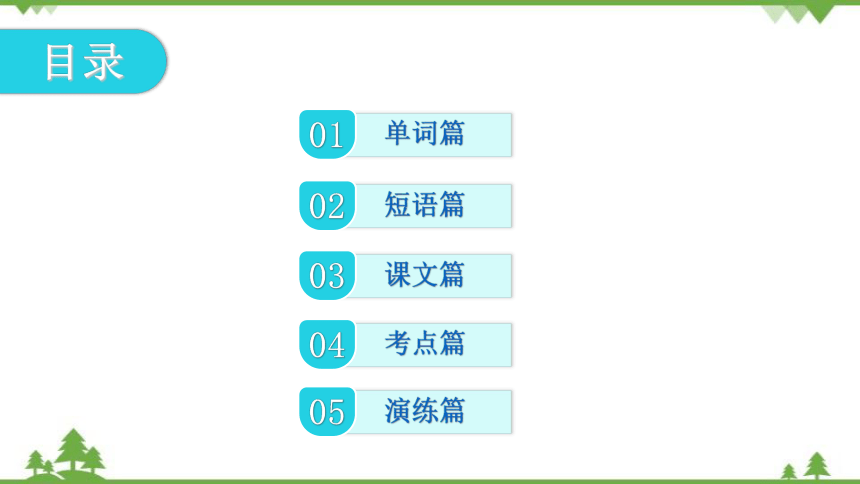
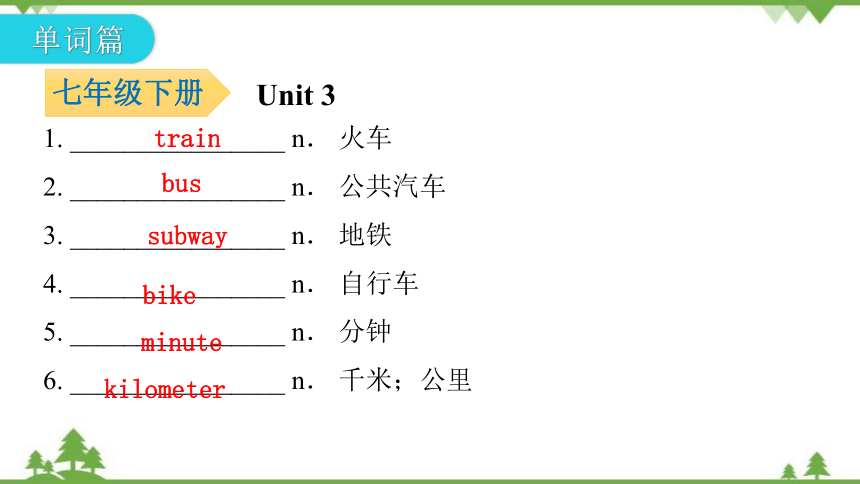
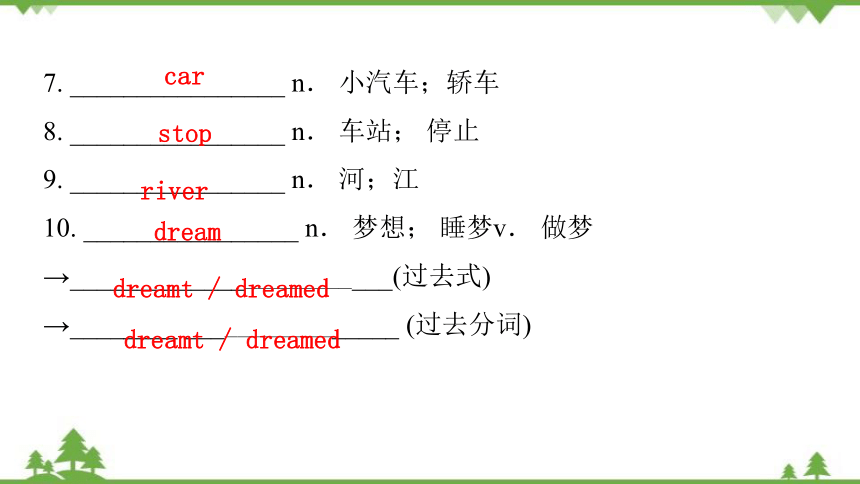
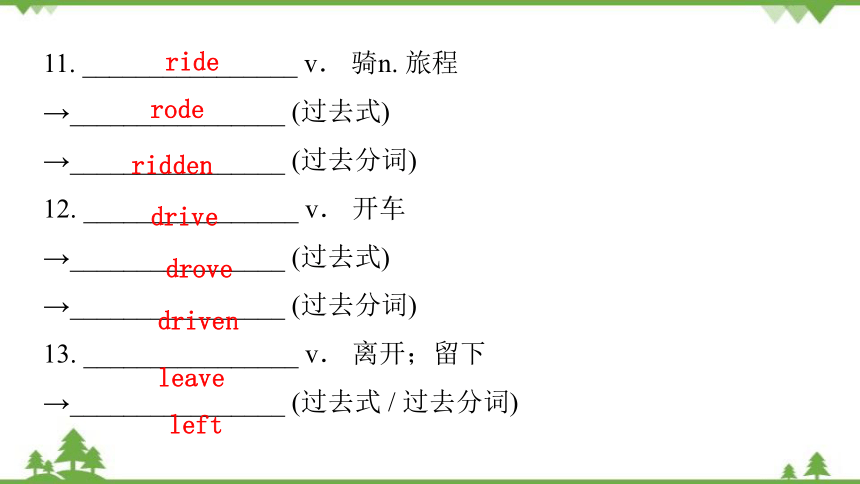
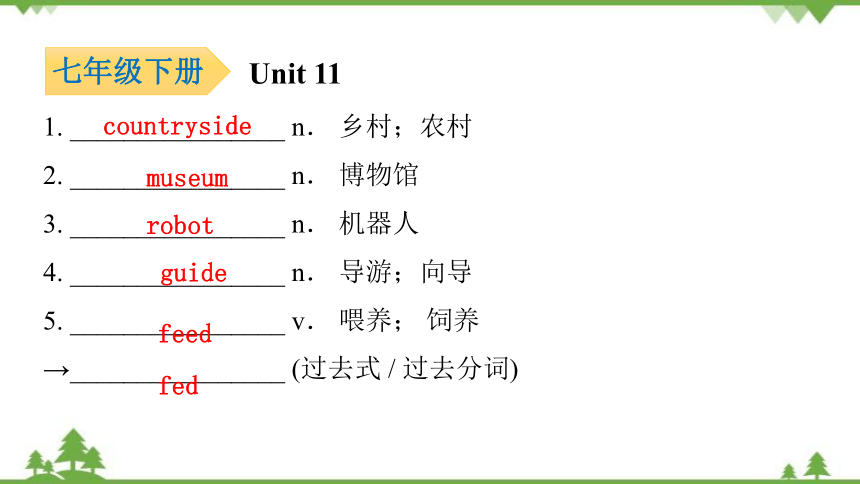
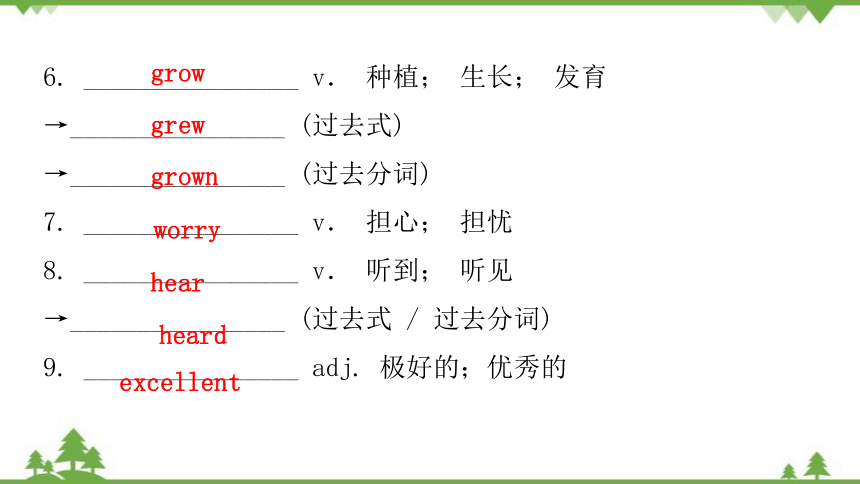
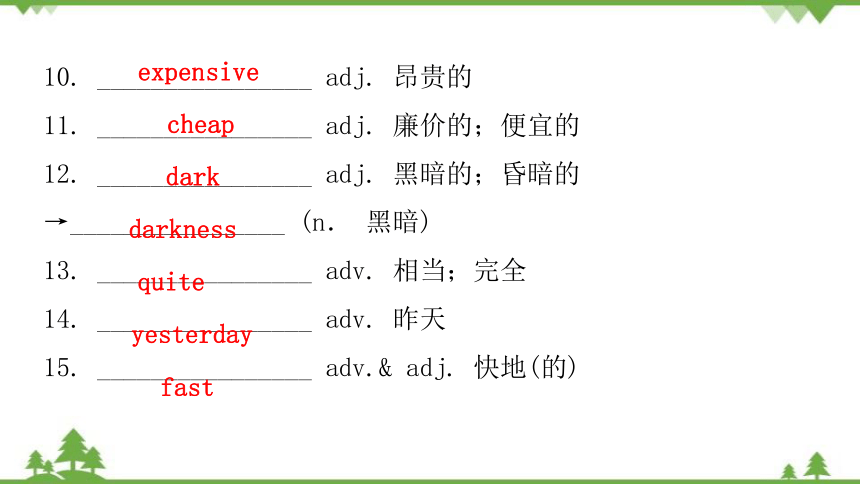
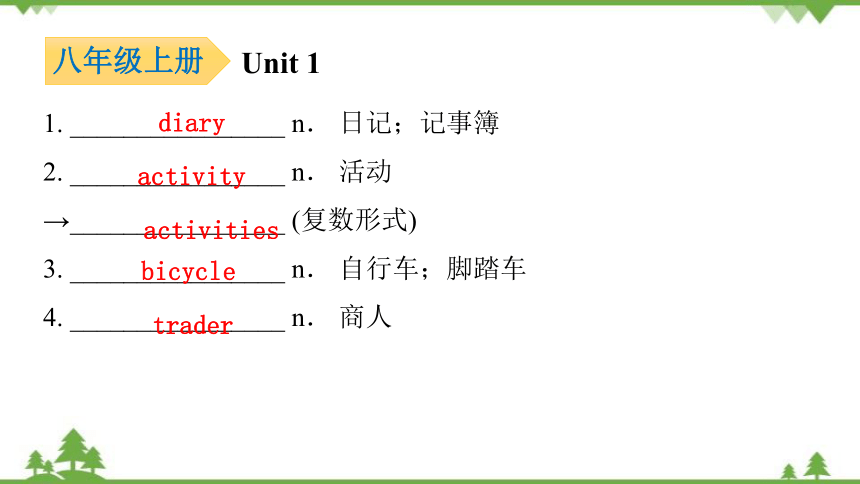

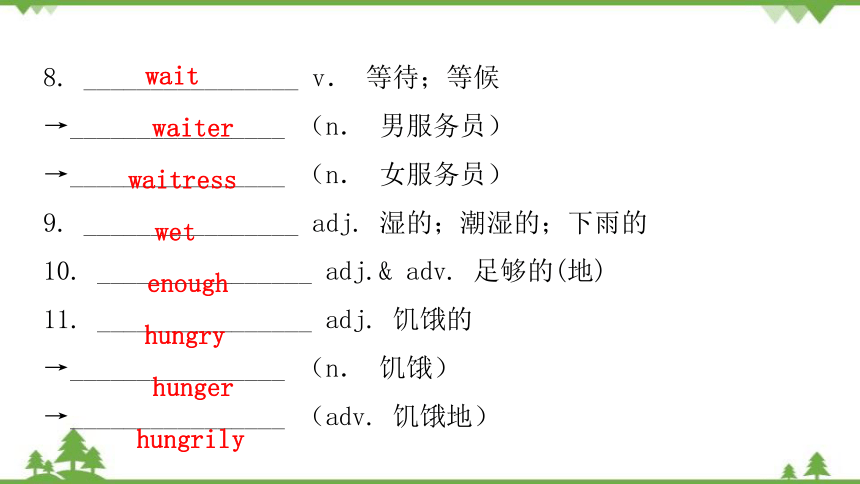
文档简介
(共75张PPT)
教材梳理(RJ)
话题七 旅游与交通、历史与社会
单元 主题
七年级下册 Unit 3 How do you get to school Transportation
七年级下册 Unit 11 How was your school trip School trips
八年级上册 Unit 1 Where did you go on vacation Holidays and vacations
八年级下册 Unit 9 Have you ever been to a museum Fun places
九年级 Unit 3 Could you please tell me where the restrooms are Getting around
目录
01
单词篇
02
短语篇
03
课文篇
04
考点篇
05
演练篇
单词篇
七年级下册
Unit 3
1. ________________ n. 火车
2. ________________ n. 公共汽车
3. ________________ n. 地铁
4. ________________ n. 自行车
5. ________________ n. 分钟
6. ________________ n. 千米;公里
train
bus
subway
bike
minute
kilometer
7. ________________ n. 小汽车;轿车
8. ________________ n. 车站; 停止
9. ________________ n. 河;江
10. ________________ n. 梦想; 睡梦v. 做梦
→________________________(过去式)
→________ ________________ (过去分词)
car
stop
river
dream
dreamt / dreamed
dreamt / dreamed
11. ________________ v. 骑n. 旅程
→________________ (过去式)
→________________ (过去分词)
12. ________________ v. 开车
→________________ (过去式)
→________________ (过去分词)
13. ________________ v. 离开;留下
→________________ (过去式 / 过去分词)
ride
rode
ridden
drive
drove
driven
leave
left
1. ________________ n. 乡村;农村
2. ________________ n. 博物馆
3. ________________ n. 机器人
4. ________________ n. 导游;向导
5. ________________ v. 喂养; 饲养
→________________ (过去式 / 过去分词)
七年级下册
Unit 11
countryside
museum
robot
guide
feed
fed
6. ________________ v. 种植; 生长; 发育
→________________ (过去式)
→________________ (过去分词)
7. ________________ v. 担心; 担忧
8. ________________ v. 听到; 听见
→________________ (过去式 / 过去分词)
9. ________________ adj. 极好的;优秀的
grow
grew
grown
worry
hear
heard
excellent
10. ________________ adj. 昂贵的
11. ________________ adj. 廉价的;便宜的
12. ________________ adj. 黑暗的;昏暗的
→________________ (n. 黑暗)
13. ________________ adv. 相当;完全
14. ________________ adv. 昨天
15. ________________ adv.& adj. 快地(的)
expensive
cheap
dark
darkness
quite
yesterday
fast
1. ________________ n. 日记;记事簿
2. ________________ n. 活动
→________________ (复数形式)
3. ________________ n. 自行车;脚踏车
4. ________________ n. 商人
八年级上册
Unit 1
diary
activity
activities
bicycle
trader
5. ________________ n. 差别;差异
→________________ (adj. 不同的)
→________________ (adv. 不同地)
6. ________________ v. 好像;似乎;看来
7. ________________ v. 决定;选定
→________________ (n. 决定)
difference
different
differently
seem
decide
decision
8. ________________ v. 等待;等候
→________________ (n. 男服务员)
→________________ (n. 女服务员)
9. ________________ adj. 湿的;潮湿的;下雨的
10. ________________ adj.& adv. 足够的(地)
11. ________________ adj. 饥饿的
→________________ (n. 饥饿)
→________________ (adv. 饥饿地)
wait
waiter
waitress
wet
enough
hungry
hunger
hungrily
1. ________________ n.照相机;摄影机;摄像机
2. ________________ n. 供乘骑的游乐设施;短途旅程
3. ________________ n. 省份
4. ________________ n. 春天
5. ________________ v.& n.进步;进展
6. ________________ v. 鼓励
→________________ (n. 鼓励)
八年级下册
Unit 9
camera
ride
province
spring
progress
encourage
encouragement
7. ________________ v. 收集;采集
→________________ (n. 收藏品)
→________________ (n.收藏家)
8. ________________ v.& n. 害怕;惧怕
→________________ (adj. 害怕的)
9. ________________ adj. 难以置信的
10. ________________ adj. 迅速的;快速的
→________________ (adv. 迅速地)
collect
collection
collector
fear
fearful
unbelievable
rapid
rapidly
11. ________________ adj. 和平的;安宁的
→________________ (n. 和平)
12. _________________ adj. 德国的n. 德语;德国人
→________________ (复数形式)
→________________ (n. 德国)
13. ________________ adj. 安全的;无危险的
→________________ (adv. 安全地)
→________________ (n. 安全)
peaceful
peace
German
Germans
Germany
safe
safely
safety
1. ________________ n. 邮票;印章
2. ________________ n. 明信片
3. ________________ n. 拐角;角落
4. ________________ n.& v. 要求;请求
5. ________________ n. 方向;方位
→________________ (adj. 直接的)
→________________ (adv. 直接地)
→________________ (n. 导演)
九年级
Unit 3
stamp
postcard
corner
request
direction
direct
directly
director
6. ________________ n. 住址;地址;通讯处
7. ________________ v. 原谅interj. 请再说一遍
8. ________________ v.& n. 仓促;急促
9. ________________ v. 邮寄;发电子邮件n.邮件
10. ________________ adj. 便利的;方便的
→________________ (n. 方便)
→________________ (adj.不方便的)
address
pardon
rush
mail
convenient
convenience
inconvenient
11. ________________ adj. 正确的;恰当的
→________________ (adv. 正确地)
12. ________________ adj. 有礼貌的;客气的
→________________ (adv. 礼貌地)
→________________ (adj. 无礼的)
13. ________________ adj. 地下的n.地铁
correct
correctly
polite
politely
impolite
underground
短语篇
七年级下册
Unit 3
1.骑自行车 __________________________
2.每天 __________________________
3.公共汽车停靠站 __________________________
4.地铁站 __________________________
5.认为;想起 __________________________
6.在……和……之间 __________________________
ride a bike
every day
bus stop
subway station
think of
between … and …
7.实现;成为现实 ________________
8.乘火车 / 公共汽车 / 地铁 / 船
_________________________________________________
9.乘火车 / 公共汽车 / 地铁 / 船
_________________________________________________
come true
take the train / bus / subway / boat
by train / bus / subway / boat
七年级下册
Unit 11
1.给奶牛挤奶 ________________
2.骑马 ________________
3.喂鸡 ________________
4.许多 _____________________
5.在乡下;在农村 ______________________
6.去钓鱼 ________________
milk a cow
ride a horse
feed chickens
quite a lot (of …)
in the countryside
go fishing
7.消防站 ________________
8.科学博物馆 ________________
9.沿途 ________________
10.总的说来 ________________
11.对……感兴趣 ____________________
12.做某事很困难 __________________________
13.根本不;完全不 ________________
fire station
science museum
along the way
all in all
be interested in
it is difficult to do sth.
not … at all
八年级上册
Unit 1
1.去度假 _________________________
2.去海滩 _________________________
3.去夏令营 _________________________
4.四处走走 _________________________
5.拍照 _________________________
6.备考 _________________________
go on vacation
go to the beach
go to summer camp
walk around
take photos
study for tests
7.尝起来不错 ___________________
8.到达 _________________
9.学一些重要的东西 _______________________________
10.给……的感觉;感受到 ________________
taste good
arrive in
learn something important
feel like
11.相当多;不少 ________________
12.给某人买某物 ___________________
13.决定做某事 ___________________
14.尝试做某事 __________________
quite a few
buy sth. for sb.
decide to do sth.
try doing sth.
八年级下册
Unit 9
1.全年 ___________________________
2.离……远 ___________________________
3.去过某地 ___________________________
4.历史博物馆 ___________________________
5.游乐场 ___________________________
6.以如此迅猛的方式 ___________________________
7.各种各样的 ___________________________
all year round
be far from
have been to sp.
history museum
amusement park
in such a rapid way
different kinds of
8.茶具 ________________
9.鼓励某人做某事 ____________________________
10.兜风 ________________
11.一个讲英语的国家 _______________________________
12.一方面……另一方面……
________________________________________
tea set
encourage sb. to do sth.
take a ride
an English-speaking country
on the one hand … on the other hand …
九年级
Unit 3
1.在某人的右边 ___________________
2.右拐 / 左拐 __________________
3.路过;经过 ________________
4.以……开始 ________________
5.抓住某人的手 _____________________
6.在某人去……的路上 ______________________
7.礼貌地请求帮助 ________________ ________
on one’s right
turn right / left
pass by
start with …
hold one’s hand
on one’s way to …
ask for help politely
8.电子邮箱地址 __________________
9.停车场;停车区 ________________
10.对做某事感到兴奋 _______________________
11.花费时间做某事 ______________________________
12.期望(做)某事 ______________________________
e-mail address
parking lot
be excited to do sth.
spend time (in) doing sth.
look forward to (doing) sth.
七年级下册
Unit 3
1.对于很多学生来说,到达学校是容易的。
________________________________________________
2.——你怎样上学
________________________________________________
——我骑自行车(上学)。
________________________________________________
课文篇
For many students, it is easy to get to school.
—How do you get to school
—I ride my bike.
3.——你到学校要用多少时间
________________________________________________
——骑自行车大概15分钟。
________________________________________________
4.——从你家到学校有多远
________________________________________________
——只有大概两千米。
________________________________________________
—How long does it take you to get to school
—About 15 minutes by bike.
—How far is it from your home to school
—It’s only about two kilometers.
5.在他们的学校和村庄之间有一条很大的河。
__________ a very big river ___________ their school ________ the village.
There is
between
and
七年级下册
Unit 11
1.幸运的是,(天)没有下雨,太阳又出来了!
________________________________________________
2.然后,导游教我们如何制作机器人模型。
________________________________________________
3.一切都与机器人有关,而我对机器人不感兴趣。
____________ was about robots and ____________________ that.
Luckily, it didn’t rain, and the sun came out again!
Then the guide taught us how to make a model robot.
Everything
I’m not interested in
八年级上册
Unit 1
1.我想知道过去这儿的生活是什么样的。
_____________________________________________________
2.一天的差异是多么大呀!
_____________________________________________________
I wonder what life was like here in the past.
What a difference a day makes!
3.——你去哪里度假了
_____________________________________________
——我去了纽约。
_____________________________________________
4.——食物怎么样
_____________________________________________
——每样东西尝起来都很美味!
_____________________________________________
—Where did you go on vacation
—I went to New York City.
—How was the food
—Everything tasted really good!
八年级下册
Unit 9
1.你曾经去过科学博物馆吗
________________________________________________
2.很难相信科技竟以如此快速的方式发展!
________________________________________________
________________________________________________
Have you ever been to a science museum
It’s unbelievable that technology has progressed in such a rapid way!
3.新加坡是一个说英语的国家,所以它也是一个你练习英语的好地方!
Singapore is ________________________________, so it’s also ____________________________ your English!
4.看沏茶的过程和饮茶本身一样令人愉快。
____________________________ is just _________________ drinking the tea itself.
an English-speaking country
a good place to practice
Watching the tea preparation
as enjoyable as
九年级
Unit 3
1.知道如何礼貌地寻求帮助是重要的。
_____________________________________________
2.他们使用的表达方式也许取决于他们正在跟谁说话或者他们对彼此的了解程度。
The expressions they use might ________________ whom they ________________ or ________________ they know each other.
It is important to know how to ask for help politely.
depend on
are speaking to
how well
考点1
与how有关的疑问短语【七年级下册 Unit 3】
专练
( )1.—How far is it from here —It’s about _________.
A.10 minutes walk B.10 minutes’ walk
C.10 minute’s walk D.10 minutes’s walk
考点篇
B
( )2.—_________ is it from Beijing to Shanghai
—About 1,300 kilometers.
A.How far B.How long C.How often D.How much
( )3.—_________does it take to get to school
—Half an hour.
A.How long B.How far C.How often D.How much
( )4.—_________ is the sweater —It is about 11 dollars.
A.How many B.How long C.How much D.How far
A
A
C
点拨
短语 含义 用法 答语
how often 多久一次 提问频率 once a week或every day等频度副词或短语
how long 多长 提问物体的长度 长度单位
多久 提问一段时间 ①for +一段时间
②since+某个时间点
how soon 多久以后 提问某个动作多长时间之后发生或结束 in+一段时间
点拨
短语 含义 用法 答语
how many 多少 提问可数名词的数量 数词(+名词)
how much 多少 提问不可数名词的数量 数词+量词(+名词)
提问价格 数词+货币单位
how far 多远 提问距离 数词+长度单位
考点2
复合不定代词【八年级上册 Unit 1】
专练
( )1.It was so dark in the room that Linda could see _____ there.
A.nothing B.anything C.something D.everything
( )2.Children like this book because there’s ______ interesting in it.
A.anything B.something C.nothing D.everything
A
B
( )3.I feel so tired that I don’t want to do _________.
A.something B.anything C.nothing D.everything
( )4.—Is _________ here
—No, Lily and Jenny are still on the way.
A.someone B.anyone C.no one D.everyone
B
D
( )5.—Sam, _______ is waiting for you outside the dining hall.
—Oh, thank you. That may be my cousin.
A.someone B.anyone C.everyone D.no one
A
点拨 1.由some, any, no, every与thing, one, body 构成的不定代词称为复合不定代词,如something, anyone, no one等。2.复合不定代词作主语时,都作单数看待,谓语动词用第三人称单数。3.形容词作定语修饰复合不定代词时,要放在不定代词之后。(详解见主书第一部分[第五节 代词])
考点3
enough的用法【八年级上册 Unit 1】
专练 根据汉语意思完成句子,词数不限
1.我们有足够多的书给这些孩子们。
We have ________________ for the children.
2.这个房间足够大,可以容纳二十个人。
The room is ________________________ hold 20 people.
3.我们离开得不够早。We didn’t leave ________________.
enough books
big / large enough to
early enough
点拨 enough作形容词,意为“足够的;充分的”,在句子中作定语或表语。enough也可作副词,意为“充分地;足够地”,通常放在所修饰的形容词、副词或动词后面。其常见搭配为“… enough to …”。
考点4
because of和because的区别【八年级上册 Unit 1】
专练 根据句意,用because或because of填空
1.Jane didn’t go to school ________________ her illness.
2.I close the windows ____________ the wind is blowing strongly.
3.They are here ________________ us.
4.He cried ______________ what I told him.
because of
because
because of
because of
点拨 because of为介词短语,后可接名词、代词、动词-ing形式或what从句等。because作连词,后跟句子,构成原因状语从句。
考点5
have gone to, have been to和have been in的区别【八年级下册 Unit 9】
专练
( )1.Sanya is a beautiful city. I _________ there twice.
A.went B.have been C.have been to D.will go
( )2.—May I speak to Ann
—Sorry,she isn’t in. She _________ France.
A.has gone to B.has been to
C.was going to D.will go to
B
A
( )3.Julie’s father _____ to London last month. He ______ there three times.
A.went; had gone B.has gone; has been
C.went; has been D.has been; has gone
( )4.Julie’s father _________ London for a month.
A.had gone to B.has been to C.has been in D.went
C
C
点拨 have gone to表示“已去某地(未回)”,强调说话人不在现场。have been to表示“曾去过某地(已回)”,侧重指经历,后面一般接次数。have been in表示“已经在某地(待了一段时间)”,常与表示一段时间的状语连用。
考点6
rapid, fast和quick的区别【八年级下册 Unit 9】
专练 根据句意,用fast, quick或rapid填空
1.My brother ate a ____________ breakfast and went to school in a hurry.
2.Tom runs so _____________ that I can’t catch up with him.
3.We saw the ______________ development of the society these years.
quick
fast
rapid
点拨
比较项 用法
rapid 正式用语,只用作形容词,语气较强,常用于表示抽象意义的“快速的”
fast 可用作形容词,又可用作副词。它主要指人或物体本身的速度快或动作快
quick 可用作形容词,又可用作副词。它既可指速度快,也可指反应快、动作敏捷
考点7
suggest的用法【九年级 Unit 3】
专练 汉译英
1.她脸上的表情表明她很开心。
___________________________________________________
2.她建议坐火车去那儿。
___________________________________________________
3.史密斯先生建议我们公司在这里建一座桥。
___________________________________________________
___________________________________________________
The look on her face suggested (that) she was very happy.
She suggests going there by train.
Mr.Smith suggested that our company (should) build a bridge here.
点拨 suggest作动词,意为“建议;提议”,其名词形式为suggestion。用法如下:
1.suggest sth.意为“建议 / 提议某事”。
2.suggest doing sth.意为“建议 / 提议做某事”。
3.suggest可接that引导的宾语从句,此时宾语从句要用虚拟语气,即should+动词原形,其中should可省略。
【拓展】suggest还可意为“显示;表明”,其主语往往是事物,后可接that从句,that可省略。
演练篇
一、语法选择
Have you ever thought about seeing the world for free It may sound _1 _, but there’s a growing community that is making that dream one step closer.
The community _2 _ Couchsurfing(沙发客).The idea is that people open their homes up to travelers for free.It lets people _3 _
impossible
is called
sleep
on the couch of a host.And in exchange both people will learn from each other.
Instead of paying a lot of money to stay in hotels,living with locals _4 _ both cheap and authentic(可靠的).Maybe you’ll find a hidden attraction in the city.This is also your chance to ask _5 _ life in their country is really like.
It also works _6 _ cultural exchanges.For example, _7 _ you can play the guitar and your host is a great cook,teach him or her
is
what
as
if
how to play and say thank you for the dinner.This type of exchange is popular.
But what are some manners of being a good couchsurfer First,be careful about cultural taboos(禁忌).For example,if you eat with Indians,never use _8 _ left hand.In Indian culture,left hands are used for the toilet.
your
Also,when you are going to leave,it’s _9 _ good idea to prepare a small gift.This _10 _ our appreciation for the home owner.
Now,are you ready to travel as a couchsurfer Where will you surf first
a
shows
( )1.A.possible B.possibly C.impossible D.possibility
( )2.A.call B.is calling C.is called D.was called
( )3.A.sleep B.sleeps C.sleeping D.to sleep
( )4.A.was B.were C.is D.are
( )5.A.when B.how C.who D.what
C
C
A
C
D
( )6.A.of B.as C.in D.to
( )7.A.though B.unless C.if D.because
( )8.A.you B.your C.yours D.yourself
( )9.A.a B.an C.the D./
( )10.A.show B.shows C.showed D.is showing
B
C
B
A
B
二、阅读理解(A篇)
Summer vacation is coming. Do you want to have a wonderful holiday Have a look at our exciting activities and decide what kind of trip you would like.
Active Holidays
It’s for everyone—people who love taking risks or who just like sports. We have many water, snow and desert activities. If you like water, you can surf in the sea. If you prefer snow, you can try skiing or making snowmen. For those who love warmer weather, you can go mountain climbing with your friends.
Adults: 120 / day
Children under 12: 60 / day
续表
Cultural Tours
Our cultural tours will help you learn about cities with ancient culture, such as Beijing, Nanjing, Xi’an. Let’s visit old temples, palaces and so on. Just remember to bring your camera. You can get to know local ways of life by visiting markets,trying local food and meeting local people. The tours will last for eight days.
Adults: 150 / day
Children under 12: 100 / day
续表
Hiking Tours
Every weekend,we have hiking trips to famous places. You don’t need to be too sporty. Just be healthy. You’ll have a great time enjoying nature with a group of new friends. You don’t have to carry too many things. We’ll offer tents to you.
Adults: 60 / day
Children under 12: 30 / day
续表
Call Sunshine Travel Agency at 6971-2339 for more information. Or e-mail us at SunshineTravel@.
Wildlife Holidays
We organize small group tours to get closer to nature in Africa, Asia or South America. Go on safari in Africa and watch lions and giraffes. Look for tigers in India or take an elephant safari in Sri Lanka. We have local guides and you can rest in tents or houses. The tours will last for ten days.
Adults: 200 / day
Children under 12: 150 / day
( )1.You can _________ during the Active Holidays if you love warmer weather.
A. surf in the sea B. go mountain climbing
C. make snowmen D. visit old temples
( )2.If you are interested in ancient culture,you can choose _________.
A. Active Holidays B. Cultural Tours
C. Hiking Tours D. Wildlife Holidays
B
B
( )3.During Hiking Tours, the travelers _________.
A. must be with their old friends
B. need to carry tents themselves
C. must love sports very much
D. must be very healthy
D
( )4.A 10-year-old boy wants to see wildlife animals with his parents, how much do they have to pay?
A. 300. B. 320. C. 500. D. 550.
( )5.You can find the passage from _________.
A. a novel B. a story
C. an animal magazine D. a travel guide
D
D
三、回答问题
What will people do when they see someone is in trouble A group of people have carried out some tests so as to remind us to stand up for the people in need.Here is one of them.
In a cake shop, two actors acted as a blind woman named Pamela and a clerk who looked down upon the blind.Hidden cameras were recording what would happen.The blind woman
came into the shop and bought a box of twelve cupcakes.The clerk treated the woman badly at first.Then he cheated her when he gave her the change.He only gave her 6 single dollar bills instead of 34 dollars.
Would someone be brave enough to stand up for the blind woman Yes! A customer in the cake shop stopped the clerk from cheating the blind and treating her badly.And other customers
joined in soon.The first customer who helped Pamela out was interviewed later.She said it was necessary to give a hand to the people in need. “A psychology (心理学)professor once said,” she said, “‘It’s difficult to take the first step to stand up.It needs courage.’”
1.What’s the purpose of the test
__________________________________________________________________________________________________________
The purpose of the test / It is to remind us to stand up for the people in need. / To remind us to stand up for the people in need.
2.Where was the test carried out
_____________________________________________________
3.Who treated the blind woman badly
_____________________________________________________
4.How much change should the blind woman get
_____________________________________________________
_____________________________________________________
The test / It was carried out in a cake shop. / In a cake shop.
The clerk treated the blind woman / her badly. / The clerk.
The blind woman / She should get thirty-four / 34 dollars. / Thirty-four / 34 dollars.
5.What do we need before we take the first step to stand up for the people in need
_____________________________________________________
_____________________________________________________
We need courage before we take the first step to stand up for the people in need. / Courage.
谢 谢!
教材梳理(RJ)
话题七 旅游与交通、历史与社会
单元 主题
七年级下册 Unit 3 How do you get to school Transportation
七年级下册 Unit 11 How was your school trip School trips
八年级上册 Unit 1 Where did you go on vacation Holidays and vacations
八年级下册 Unit 9 Have you ever been to a museum Fun places
九年级 Unit 3 Could you please tell me where the restrooms are Getting around
目录
01
单词篇
02
短语篇
03
课文篇
04
考点篇
05
演练篇
单词篇
七年级下册
Unit 3
1. ________________ n. 火车
2. ________________ n. 公共汽车
3. ________________ n. 地铁
4. ________________ n. 自行车
5. ________________ n. 分钟
6. ________________ n. 千米;公里
train
bus
subway
bike
minute
kilometer
7. ________________ n. 小汽车;轿车
8. ________________ n. 车站; 停止
9. ________________ n. 河;江
10. ________________ n. 梦想; 睡梦v. 做梦
→________________________(过去式)
→________ ________________ (过去分词)
car
stop
river
dream
dreamt / dreamed
dreamt / dreamed
11. ________________ v. 骑n. 旅程
→________________ (过去式)
→________________ (过去分词)
12. ________________ v. 开车
→________________ (过去式)
→________________ (过去分词)
13. ________________ v. 离开;留下
→________________ (过去式 / 过去分词)
ride
rode
ridden
drive
drove
driven
leave
left
1. ________________ n. 乡村;农村
2. ________________ n. 博物馆
3. ________________ n. 机器人
4. ________________ n. 导游;向导
5. ________________ v. 喂养; 饲养
→________________ (过去式 / 过去分词)
七年级下册
Unit 11
countryside
museum
robot
guide
feed
fed
6. ________________ v. 种植; 生长; 发育
→________________ (过去式)
→________________ (过去分词)
7. ________________ v. 担心; 担忧
8. ________________ v. 听到; 听见
→________________ (过去式 / 过去分词)
9. ________________ adj. 极好的;优秀的
grow
grew
grown
worry
hear
heard
excellent
10. ________________ adj. 昂贵的
11. ________________ adj. 廉价的;便宜的
12. ________________ adj. 黑暗的;昏暗的
→________________ (n. 黑暗)
13. ________________ adv. 相当;完全
14. ________________ adv. 昨天
15. ________________ adv.& adj. 快地(的)
expensive
cheap
dark
darkness
quite
yesterday
fast
1. ________________ n. 日记;记事簿
2. ________________ n. 活动
→________________ (复数形式)
3. ________________ n. 自行车;脚踏车
4. ________________ n. 商人
八年级上册
Unit 1
diary
activity
activities
bicycle
trader
5. ________________ n. 差别;差异
→________________ (adj. 不同的)
→________________ (adv. 不同地)
6. ________________ v. 好像;似乎;看来
7. ________________ v. 决定;选定
→________________ (n. 决定)
difference
different
differently
seem
decide
decision
8. ________________ v. 等待;等候
→________________ (n. 男服务员)
→________________ (n. 女服务员)
9. ________________ adj. 湿的;潮湿的;下雨的
10. ________________ adj.& adv. 足够的(地)
11. ________________ adj. 饥饿的
→________________ (n. 饥饿)
→________________ (adv. 饥饿地)
wait
waiter
waitress
wet
enough
hungry
hunger
hungrily
1. ________________ n.照相机;摄影机;摄像机
2. ________________ n. 供乘骑的游乐设施;短途旅程
3. ________________ n. 省份
4. ________________ n. 春天
5. ________________ v.& n.进步;进展
6. ________________ v. 鼓励
→________________ (n. 鼓励)
八年级下册
Unit 9
camera
ride
province
spring
progress
encourage
encouragement
7. ________________ v. 收集;采集
→________________ (n. 收藏品)
→________________ (n.收藏家)
8. ________________ v.& n. 害怕;惧怕
→________________ (adj. 害怕的)
9. ________________ adj. 难以置信的
10. ________________ adj. 迅速的;快速的
→________________ (adv. 迅速地)
collect
collection
collector
fear
fearful
unbelievable
rapid
rapidly
11. ________________ adj. 和平的;安宁的
→________________ (n. 和平)
12. _________________ adj. 德国的n. 德语;德国人
→________________ (复数形式)
→________________ (n. 德国)
13. ________________ adj. 安全的;无危险的
→________________ (adv. 安全地)
→________________ (n. 安全)
peaceful
peace
German
Germans
Germany
safe
safely
safety
1. ________________ n. 邮票;印章
2. ________________ n. 明信片
3. ________________ n. 拐角;角落
4. ________________ n.& v. 要求;请求
5. ________________ n. 方向;方位
→________________ (adj. 直接的)
→________________ (adv. 直接地)
→________________ (n. 导演)
九年级
Unit 3
stamp
postcard
corner
request
direction
direct
directly
director
6. ________________ n. 住址;地址;通讯处
7. ________________ v. 原谅interj. 请再说一遍
8. ________________ v.& n. 仓促;急促
9. ________________ v. 邮寄;发电子邮件n.邮件
10. ________________ adj. 便利的;方便的
→________________ (n. 方便)
→________________ (adj.不方便的)
address
pardon
rush
convenient
convenience
inconvenient
11. ________________ adj. 正确的;恰当的
→________________ (adv. 正确地)
12. ________________ adj. 有礼貌的;客气的
→________________ (adv. 礼貌地)
→________________ (adj. 无礼的)
13. ________________ adj. 地下的n.地铁
correct
correctly
polite
politely
impolite
underground
短语篇
七年级下册
Unit 3
1.骑自行车 __________________________
2.每天 __________________________
3.公共汽车停靠站 __________________________
4.地铁站 __________________________
5.认为;想起 __________________________
6.在……和……之间 __________________________
ride a bike
every day
bus stop
subway station
think of
between … and …
7.实现;成为现实 ________________
8.乘火车 / 公共汽车 / 地铁 / 船
_________________________________________________
9.乘火车 / 公共汽车 / 地铁 / 船
_________________________________________________
come true
take the train / bus / subway / boat
by train / bus / subway / boat
七年级下册
Unit 11
1.给奶牛挤奶 ________________
2.骑马 ________________
3.喂鸡 ________________
4.许多 _____________________
5.在乡下;在农村 ______________________
6.去钓鱼 ________________
milk a cow
ride a horse
feed chickens
quite a lot (of …)
in the countryside
go fishing
7.消防站 ________________
8.科学博物馆 ________________
9.沿途 ________________
10.总的说来 ________________
11.对……感兴趣 ____________________
12.做某事很困难 __________________________
13.根本不;完全不 ________________
fire station
science museum
along the way
all in all
be interested in
it is difficult to do sth.
not … at all
八年级上册
Unit 1
1.去度假 _________________________
2.去海滩 _________________________
3.去夏令营 _________________________
4.四处走走 _________________________
5.拍照 _________________________
6.备考 _________________________
go on vacation
go to the beach
go to summer camp
walk around
take photos
study for tests
7.尝起来不错 ___________________
8.到达 _________________
9.学一些重要的东西 _______________________________
10.给……的感觉;感受到 ________________
taste good
arrive in
learn something important
feel like
11.相当多;不少 ________________
12.给某人买某物 ___________________
13.决定做某事 ___________________
14.尝试做某事 __________________
quite a few
buy sth. for sb.
decide to do sth.
try doing sth.
八年级下册
Unit 9
1.全年 ___________________________
2.离……远 ___________________________
3.去过某地 ___________________________
4.历史博物馆 ___________________________
5.游乐场 ___________________________
6.以如此迅猛的方式 ___________________________
7.各种各样的 ___________________________
all year round
be far from
have been to sp.
history museum
amusement park
in such a rapid way
different kinds of
8.茶具 ________________
9.鼓励某人做某事 ____________________________
10.兜风 ________________
11.一个讲英语的国家 _______________________________
12.一方面……另一方面……
________________________________________
tea set
encourage sb. to do sth.
take a ride
an English-speaking country
on the one hand … on the other hand …
九年级
Unit 3
1.在某人的右边 ___________________
2.右拐 / 左拐 __________________
3.路过;经过 ________________
4.以……开始 ________________
5.抓住某人的手 _____________________
6.在某人去……的路上 ______________________
7.礼貌地请求帮助 ________________ ________
on one’s right
turn right / left
pass by
start with …
hold one’s hand
on one’s way to …
ask for help politely
8.电子邮箱地址 __________________
9.停车场;停车区 ________________
10.对做某事感到兴奋 _______________________
11.花费时间做某事 ______________________________
12.期望(做)某事 ______________________________
e-mail address
parking lot
be excited to do sth.
spend time (in) doing sth.
look forward to (doing) sth.
七年级下册
Unit 3
1.对于很多学生来说,到达学校是容易的。
________________________________________________
2.——你怎样上学
________________________________________________
——我骑自行车(上学)。
________________________________________________
课文篇
For many students, it is easy to get to school.
—How do you get to school
—I ride my bike.
3.——你到学校要用多少时间
________________________________________________
——骑自行车大概15分钟。
________________________________________________
4.——从你家到学校有多远
________________________________________________
——只有大概两千米。
________________________________________________
—How long does it take you to get to school
—About 15 minutes by bike.
—How far is it from your home to school
—It’s only about two kilometers.
5.在他们的学校和村庄之间有一条很大的河。
__________ a very big river ___________ their school ________ the village.
There is
between
and
七年级下册
Unit 11
1.幸运的是,(天)没有下雨,太阳又出来了!
________________________________________________
2.然后,导游教我们如何制作机器人模型。
________________________________________________
3.一切都与机器人有关,而我对机器人不感兴趣。
____________ was about robots and ____________________ that.
Luckily, it didn’t rain, and the sun came out again!
Then the guide taught us how to make a model robot.
Everything
I’m not interested in
八年级上册
Unit 1
1.我想知道过去这儿的生活是什么样的。
_____________________________________________________
2.一天的差异是多么大呀!
_____________________________________________________
I wonder what life was like here in the past.
What a difference a day makes!
3.——你去哪里度假了
_____________________________________________
——我去了纽约。
_____________________________________________
4.——食物怎么样
_____________________________________________
——每样东西尝起来都很美味!
_____________________________________________
—Where did you go on vacation
—I went to New York City.
—How was the food
—Everything tasted really good!
八年级下册
Unit 9
1.你曾经去过科学博物馆吗
________________________________________________
2.很难相信科技竟以如此快速的方式发展!
________________________________________________
________________________________________________
Have you ever been to a science museum
It’s unbelievable that technology has progressed in such a rapid way!
3.新加坡是一个说英语的国家,所以它也是一个你练习英语的好地方!
Singapore is ________________________________, so it’s also ____________________________ your English!
4.看沏茶的过程和饮茶本身一样令人愉快。
____________________________ is just _________________ drinking the tea itself.
an English-speaking country
a good place to practice
Watching the tea preparation
as enjoyable as
九年级
Unit 3
1.知道如何礼貌地寻求帮助是重要的。
_____________________________________________
2.他们使用的表达方式也许取决于他们正在跟谁说话或者他们对彼此的了解程度。
The expressions they use might ________________ whom they ________________ or ________________ they know each other.
It is important to know how to ask for help politely.
depend on
are speaking to
how well
考点1
与how有关的疑问短语【七年级下册 Unit 3】
专练
( )1.—How far is it from here —It’s about _________.
A.10 minutes walk B.10 minutes’ walk
C.10 minute’s walk D.10 minutes’s walk
考点篇
B
( )2.—_________ is it from Beijing to Shanghai
—About 1,300 kilometers.
A.How far B.How long C.How often D.How much
( )3.—_________does it take to get to school
—Half an hour.
A.How long B.How far C.How often D.How much
( )4.—_________ is the sweater —It is about 11 dollars.
A.How many B.How long C.How much D.How far
A
A
C
点拨
短语 含义 用法 答语
how often 多久一次 提问频率 once a week或every day等频度副词或短语
how long 多长 提问物体的长度 长度单位
多久 提问一段时间 ①for +一段时间
②since+某个时间点
how soon 多久以后 提问某个动作多长时间之后发生或结束 in+一段时间
点拨
短语 含义 用法 答语
how many 多少 提问可数名词的数量 数词(+名词)
how much 多少 提问不可数名词的数量 数词+量词(+名词)
提问价格 数词+货币单位
how far 多远 提问距离 数词+长度单位
考点2
复合不定代词【八年级上册 Unit 1】
专练
( )1.It was so dark in the room that Linda could see _____ there.
A.nothing B.anything C.something D.everything
( )2.Children like this book because there’s ______ interesting in it.
A.anything B.something C.nothing D.everything
A
B
( )3.I feel so tired that I don’t want to do _________.
A.something B.anything C.nothing D.everything
( )4.—Is _________ here
—No, Lily and Jenny are still on the way.
A.someone B.anyone C.no one D.everyone
B
D
( )5.—Sam, _______ is waiting for you outside the dining hall.
—Oh, thank you. That may be my cousin.
A.someone B.anyone C.everyone D.no one
A
点拨 1.由some, any, no, every与thing, one, body 构成的不定代词称为复合不定代词,如something, anyone, no one等。2.复合不定代词作主语时,都作单数看待,谓语动词用第三人称单数。3.形容词作定语修饰复合不定代词时,要放在不定代词之后。(详解见主书第一部分[第五节 代词])
考点3
enough的用法【八年级上册 Unit 1】
专练 根据汉语意思完成句子,词数不限
1.我们有足够多的书给这些孩子们。
We have ________________ for the children.
2.这个房间足够大,可以容纳二十个人。
The room is ________________________ hold 20 people.
3.我们离开得不够早。We didn’t leave ________________.
enough books
big / large enough to
early enough
点拨 enough作形容词,意为“足够的;充分的”,在句子中作定语或表语。enough也可作副词,意为“充分地;足够地”,通常放在所修饰的形容词、副词或动词后面。其常见搭配为“… enough to …”。
考点4
because of和because的区别【八年级上册 Unit 1】
专练 根据句意,用because或because of填空
1.Jane didn’t go to school ________________ her illness.
2.I close the windows ____________ the wind is blowing strongly.
3.They are here ________________ us.
4.He cried ______________ what I told him.
because of
because
because of
because of
点拨 because of为介词短语,后可接名词、代词、动词-ing形式或what从句等。because作连词,后跟句子,构成原因状语从句。
考点5
have gone to, have been to和have been in的区别【八年级下册 Unit 9】
专练
( )1.Sanya is a beautiful city. I _________ there twice.
A.went B.have been C.have been to D.will go
( )2.—May I speak to Ann
—Sorry,she isn’t in. She _________ France.
A.has gone to B.has been to
C.was going to D.will go to
B
A
( )3.Julie’s father _____ to London last month. He ______ there three times.
A.went; had gone B.has gone; has been
C.went; has been D.has been; has gone
( )4.Julie’s father _________ London for a month.
A.had gone to B.has been to C.has been in D.went
C
C
点拨 have gone to表示“已去某地(未回)”,强调说话人不在现场。have been to表示“曾去过某地(已回)”,侧重指经历,后面一般接次数。have been in表示“已经在某地(待了一段时间)”,常与表示一段时间的状语连用。
考点6
rapid, fast和quick的区别【八年级下册 Unit 9】
专练 根据句意,用fast, quick或rapid填空
1.My brother ate a ____________ breakfast and went to school in a hurry.
2.Tom runs so _____________ that I can’t catch up with him.
3.We saw the ______________ development of the society these years.
quick
fast
rapid
点拨
比较项 用法
rapid 正式用语,只用作形容词,语气较强,常用于表示抽象意义的“快速的”
fast 可用作形容词,又可用作副词。它主要指人或物体本身的速度快或动作快
quick 可用作形容词,又可用作副词。它既可指速度快,也可指反应快、动作敏捷
考点7
suggest的用法【九年级 Unit 3】
专练 汉译英
1.她脸上的表情表明她很开心。
___________________________________________________
2.她建议坐火车去那儿。
___________________________________________________
3.史密斯先生建议我们公司在这里建一座桥。
___________________________________________________
___________________________________________________
The look on her face suggested (that) she was very happy.
She suggests going there by train.
Mr.Smith suggested that our company (should) build a bridge here.
点拨 suggest作动词,意为“建议;提议”,其名词形式为suggestion。用法如下:
1.suggest sth.意为“建议 / 提议某事”。
2.suggest doing sth.意为“建议 / 提议做某事”。
3.suggest可接that引导的宾语从句,此时宾语从句要用虚拟语气,即should+动词原形,其中should可省略。
【拓展】suggest还可意为“显示;表明”,其主语往往是事物,后可接that从句,that可省略。
演练篇
一、语法选择
Have you ever thought about seeing the world for free It may sound _1 _, but there’s a growing community that is making that dream one step closer.
The community _2 _ Couchsurfing(沙发客).The idea is that people open their homes up to travelers for free.It lets people _3 _
impossible
is called
sleep
on the couch of a host.And in exchange both people will learn from each other.
Instead of paying a lot of money to stay in hotels,living with locals _4 _ both cheap and authentic(可靠的).Maybe you’ll find a hidden attraction in the city.This is also your chance to ask _5 _ life in their country is really like.
It also works _6 _ cultural exchanges.For example, _7 _ you can play the guitar and your host is a great cook,teach him or her
is
what
as
if
how to play and say thank you for the dinner.This type of exchange is popular.
But what are some manners of being a good couchsurfer First,be careful about cultural taboos(禁忌).For example,if you eat with Indians,never use _8 _ left hand.In Indian culture,left hands are used for the toilet.
your
Also,when you are going to leave,it’s _9 _ good idea to prepare a small gift.This _10 _ our appreciation for the home owner.
Now,are you ready to travel as a couchsurfer Where will you surf first
a
shows
( )1.A.possible B.possibly C.impossible D.possibility
( )2.A.call B.is calling C.is called D.was called
( )3.A.sleep B.sleeps C.sleeping D.to sleep
( )4.A.was B.were C.is D.are
( )5.A.when B.how C.who D.what
C
C
A
C
D
( )6.A.of B.as C.in D.to
( )7.A.though B.unless C.if D.because
( )8.A.you B.your C.yours D.yourself
( )9.A.a B.an C.the D./
( )10.A.show B.shows C.showed D.is showing
B
C
B
A
B
二、阅读理解(A篇)
Summer vacation is coming. Do you want to have a wonderful holiday Have a look at our exciting activities and decide what kind of trip you would like.
Active Holidays
It’s for everyone—people who love taking risks or who just like sports. We have many water, snow and desert activities. If you like water, you can surf in the sea. If you prefer snow, you can try skiing or making snowmen. For those who love warmer weather, you can go mountain climbing with your friends.
Adults: 120 / day
Children under 12: 60 / day
续表
Cultural Tours
Our cultural tours will help you learn about cities with ancient culture, such as Beijing, Nanjing, Xi’an. Let’s visit old temples, palaces and so on. Just remember to bring your camera. You can get to know local ways of life by visiting markets,trying local food and meeting local people. The tours will last for eight days.
Adults: 150 / day
Children under 12: 100 / day
续表
Hiking Tours
Every weekend,we have hiking trips to famous places. You don’t need to be too sporty. Just be healthy. You’ll have a great time enjoying nature with a group of new friends. You don’t have to carry too many things. We’ll offer tents to you.
Adults: 60 / day
Children under 12: 30 / day
续表
Call Sunshine Travel Agency at 6971-2339 for more information. Or e-mail us at SunshineTravel@.
Wildlife Holidays
We organize small group tours to get closer to nature in Africa, Asia or South America. Go on safari in Africa and watch lions and giraffes. Look for tigers in India or take an elephant safari in Sri Lanka. We have local guides and you can rest in tents or houses. The tours will last for ten days.
Adults: 200 / day
Children under 12: 150 / day
( )1.You can _________ during the Active Holidays if you love warmer weather.
A. surf in the sea B. go mountain climbing
C. make snowmen D. visit old temples
( )2.If you are interested in ancient culture,you can choose _________.
A. Active Holidays B. Cultural Tours
C. Hiking Tours D. Wildlife Holidays
B
B
( )3.During Hiking Tours, the travelers _________.
A. must be with their old friends
B. need to carry tents themselves
C. must love sports very much
D. must be very healthy
D
( )4.A 10-year-old boy wants to see wildlife animals with his parents, how much do they have to pay?
A. 300. B. 320. C. 500. D. 550.
( )5.You can find the passage from _________.
A. a novel B. a story
C. an animal magazine D. a travel guide
D
D
三、回答问题
What will people do when they see someone is in trouble A group of people have carried out some tests so as to remind us to stand up for the people in need.Here is one of them.
In a cake shop, two actors acted as a blind woman named Pamela and a clerk who looked down upon the blind.Hidden cameras were recording what would happen.The blind woman
came into the shop and bought a box of twelve cupcakes.The clerk treated the woman badly at first.Then he cheated her when he gave her the change.He only gave her 6 single dollar bills instead of 34 dollars.
Would someone be brave enough to stand up for the blind woman Yes! A customer in the cake shop stopped the clerk from cheating the blind and treating her badly.And other customers
joined in soon.The first customer who helped Pamela out was interviewed later.She said it was necessary to give a hand to the people in need. “A psychology (心理学)professor once said,” she said, “‘It’s difficult to take the first step to stand up.It needs courage.’”
1.What’s the purpose of the test
__________________________________________________________________________________________________________
The purpose of the test / It is to remind us to stand up for the people in need. / To remind us to stand up for the people in need.
2.Where was the test carried out
_____________________________________________________
3.Who treated the blind woman badly
_____________________________________________________
4.How much change should the blind woman get
_____________________________________________________
_____________________________________________________
The test / It was carried out in a cake shop. / In a cake shop.
The clerk treated the blind woman / her badly. / The clerk.
The blind woman / She should get thirty-four / 34 dollars. / Thirty-four / 34 dollars.
5.What do we need before we take the first step to stand up for the people in need
_____________________________________________________
_____________________________________________________
We need courage before we take the first step to stand up for the people in need. / Courage.
谢 谢!
同课章节目录
- 词法
- 名词
- 动词和动词短语
- 动词语态
- 动词时态
- 助动词和情态动词
- 非谓语动词
- 冠词
- 代词
- 数词和量词
- 形容词副词及其比较等级
- 介词和介词短语
- 连词和感叹词
- 构词法
- 相似、相近词比较
- 句法
- 陈述句
- 一般疑问句和否定疑问句
- 特殊疑问句及选择疑问句
- 反意疑问句
- 存在句(There be句型)
- 宾语从句
- 定语从句
- 状语从句
- 主谓一致问题
- 简单句
- 并列句
- 复合句
- 主谓一致
- 主、表语从句
- 名词性从句
- 直接引语和间接引语
- 虚拟语气
- 感叹句
- 强调句
- 倒装句
- 祈使句
- 句子的成分
- 句子的分类
- 题型专区
- 单项选择部分
- 易错题
- 完形填空
- 阅读理解
- 词汇练习
- 听说训练
- 句型转换
- 补全对话
- 短文改错
- 翻译
- 书面表达
- 任务型阅读
- 语法填空
- 其他资料
